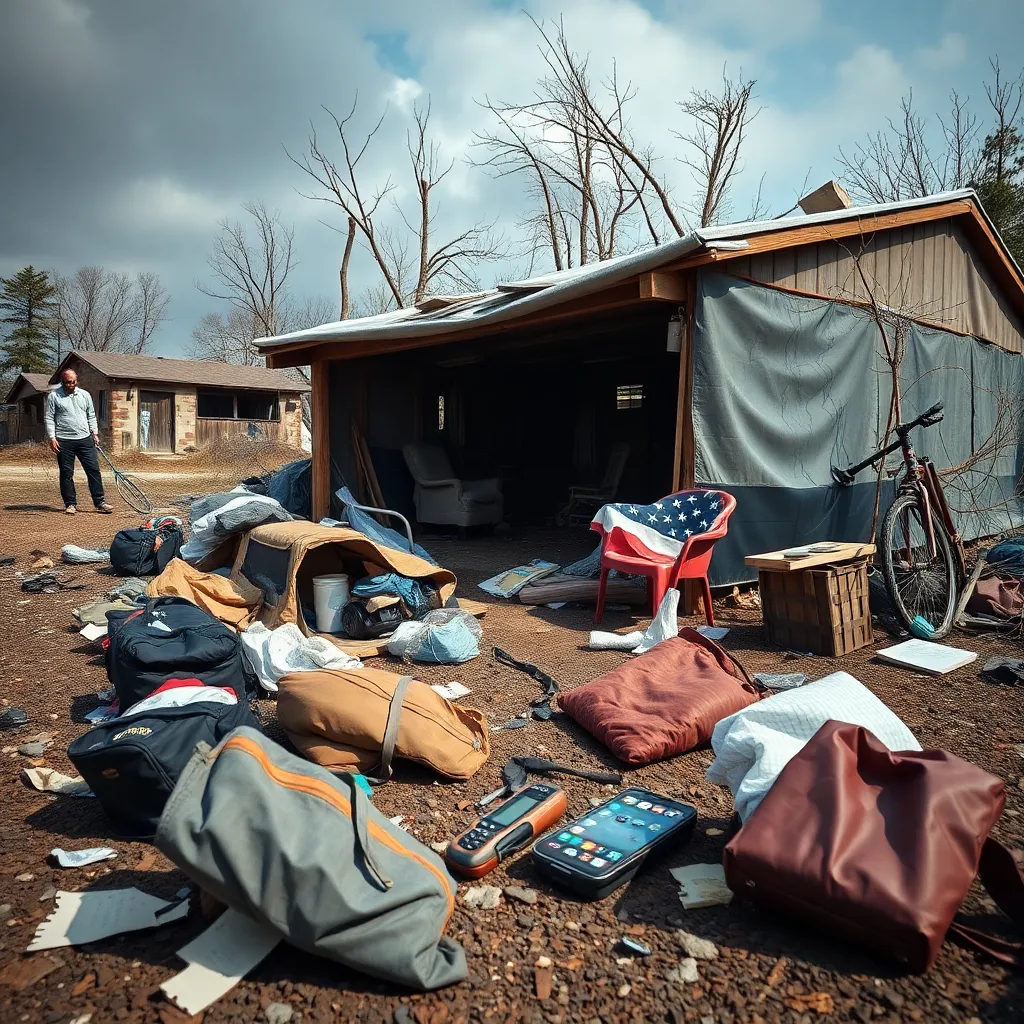

Western North Carolina Struggles with Rising Homelessness Following Hurricane Helene
In Western North Carolina, the scars from Hurricane Helene’s devastating sweep last September run deep. While the storm itself left destruction, it also left many people grappling with the harsh reality of homelessness, a problem that was already escalating in the region. The aftermath of Helene exposed a growing vulnerability amongst residents, highlighting the pressing need for comprehensive support and solutions to aid those affected.
Take, for example, the situation of a local resident, Bonnie Goggins Jones. After waist-high floodwaters inundated her mobile home in Buncombe County, she found herself displaced with her two teenage grandchildren. Currently, they reside in a donated camper parked on church grounds. “It’s just a hard thing,” Jones explains, reflecting on how confined spaces and a lack of personal belongings impact their daily lives. She misses the comfort of her former home, with its little yard and leafy trees. “It’s not your home. It’s not like a home,” she adds wistfully.
Despite having a steady job as a transportation worker for the Asheville City Schools District, the financial stability she once enjoyed feels fragile. Keeping her family fed while worrying about fuel for their camper’s generator adds to the burden, leaving little room for savings or a path to recovery.
Bonnie is not alone in her struggles. Tina Krause, the executive director of the Hospitality House of Northwest North Carolina, has witnessed a surge of families in distress since the storm. Her organization focuses on providing transitional housing support, helping those in the hardest-hit areas navigate their new realities. “We’ve seen more families realizing that their homes are unlivable now,” Krause shares. Many are individuals who, prior to Helene, weren’t facing financial hardship.
The current homeless population presents a different challenge compared to previous years. The recent data shows a sharp uptick in those affected—specifically, an estimated 20 percent increase in reported homelessness across 25 counties in the area. This has raised concerns among community leaders about the changing face of homelessness, tied closely to those who have never faced such dire situations before.
As local organizations band together to tackle these issues, the annual point-in-time count conducted each January aims to measure the actual homeless population. While the final numbers for 2024 are still pending, preliminary figures reveal a steep increase from the previous year. “For this area, we usually see a small increase, but this year it was significant,” Krause notes on the nearly 30 percent surge reported in Asheville-Buncombe’s figures.
This crisis has been exacerbated by the expiration of pandemic-era funding, which allowed many at risk of homelessness to be housed in hotels. As those resources dried up, temporary support disappeared, leaving many vulnerable once again. With the economy already strained, finding affordable housing or rental options feels like a challenge that few can overcome.
Despite the overwhelming challenges, the spirit of solidarity shines through the darkness. Grassroots organizations and the community have rallied, launching initiatives to provide everything from temporary housing to essential services following the storm. For instance, after Helene, more than 160 RVs were donated to displaced families to help them regain footing.
Yet, as Brian Alexander from the North Carolina Coalition to End Homelessness notes, it remains crucial to maintain this momentum of compassion to assist those who have suffered long before the storm. “It’s important not to lose focus on the ongoing struggles our community faces,” Alexander emphasizes.
As we look toward the future, it’s clear that Western North Carolina’s path to recovery will demand a concerted effort from everyone—locals, organizations, and government alike. With limited affordable housing options and demand only rising, proactive measures are essential. “Everybody deserves a home,” Alexander asserts, underscoring a fundamental human right amidst adversity.
This chapter in Western North Carolina’s story is still being written, shaped by both the challenges posed by Mother Nature and the resilience of its community. Together, there may be hope on the horizon that better days await.
News Summary Asheville, North Carolina, is beginning to recover from the devastating impacts of Hurricane…
News Summary The Asheville Police Department is investigating a fatal shooting that occurred early Sunday…
News Summary A shooting in Asheville has resulted in the death of 26-year-old Andy Garcia…
News Summary The Asheville Police Department is investigating a deadly shooting that occurred on Rankin…
News Summary A shooting incident in downtown Asheville has left a 26-year-old man dead and…
News Summary The Asheville Police Department is investigating a shooting that resulted in the death…